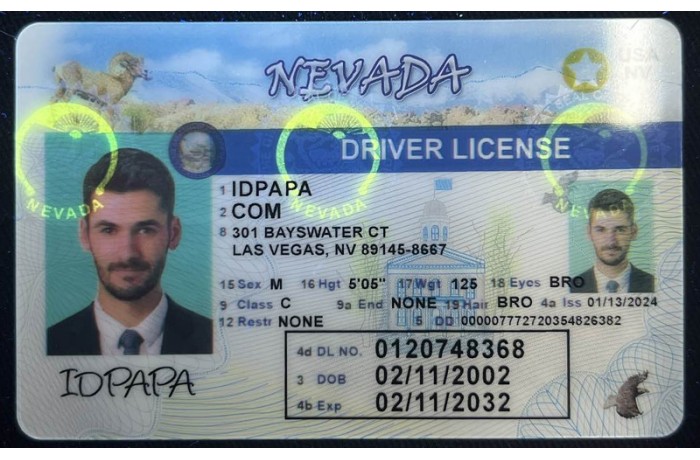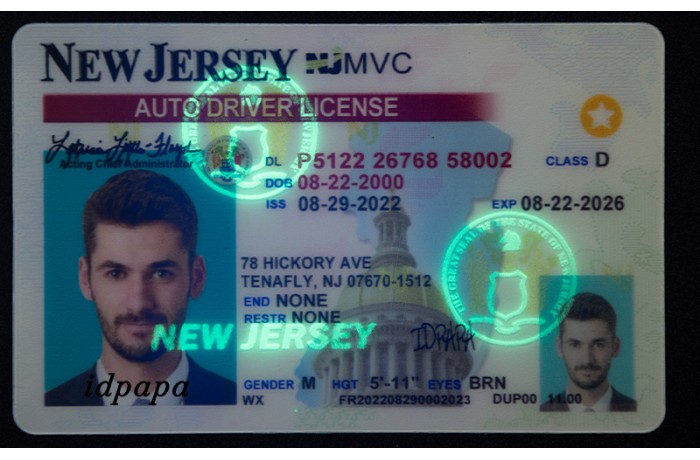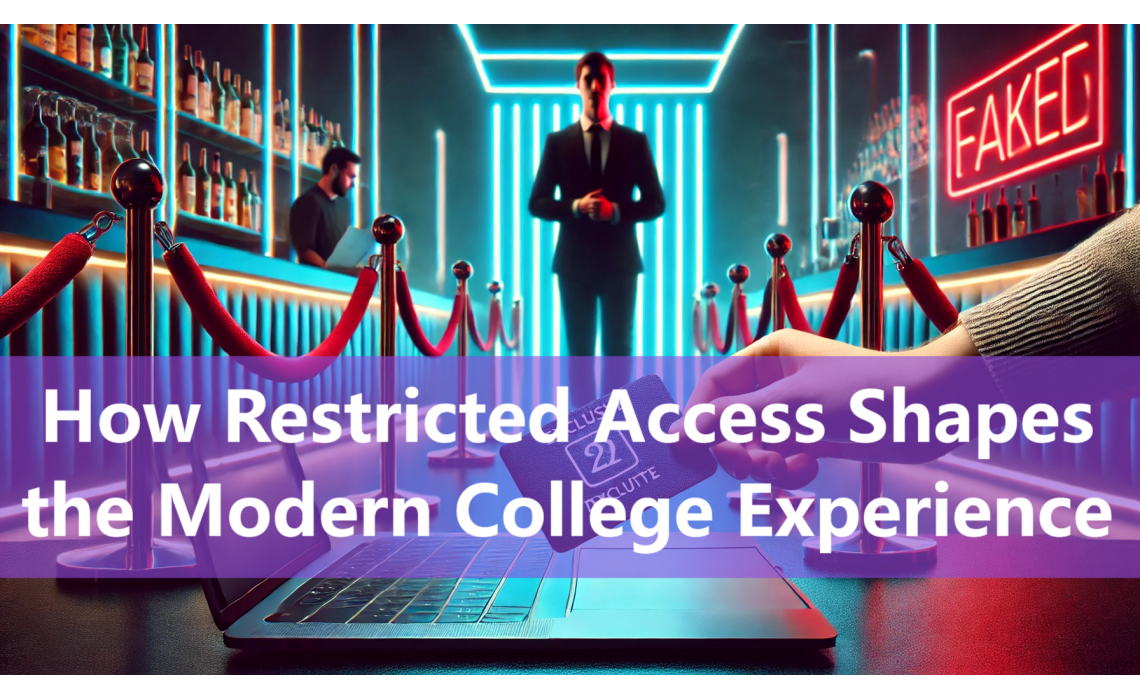The Velvet Rope: How Restricted Access Shapes the Modern College Experience (and the Fake ID Factor)
The Velvet Rope: How Restricted Access Shapes the Modern College Experience (and the Fake ID Factor)

The college experience is often romanticized as a period of unbridled freedom, exploration, and social connection. However, beneath the surface of campus life lies a complex web of restrictions, particularly regarding access to age-restricted venues and events. These limitations, while intended to promote safety and responsible behavior, significantly impact students' social spaces and create a unique dynamic that often involves the clandestine world of fake IDs.
This blog explores the ways in which restricted access shapes campus life, examining the social, psychological, and even economic consequences for students.
The Architecture of Restriction: Age Limits and Campus Culture
The most visible form of restricted access is, of course, the legal drinking age. This single number dictates where students can legally gather, socialize, and participate in certain aspects of nightlife. But the restrictions extend beyond alcohol. Many venues, from bars and nightclubs to concerts and festivals, enforce age limits, effectively creating a "velvet rope" that separates those deemed old enough from those who are not.
This architecture of restriction shapes campus culture in several ways:
●Segregation and Subcultures: Age limits create a divide between older and younger students, often leading to the formation of distinct social subcultures. Underclassmen may feel excluded from certain social circles and experiences, while upperclassmen may perceive a sense of superiority or exclusivity.
●The Rise of Alternative Social Spaces: Restricted access fuels the creation of alternative social spaces, such as house parties, off-campus gatherings, and secret events. These spaces, while often vibrant and exciting, can also be less regulated and potentially more dangerous.
●A Culture of Secrecy and Deception: The desire to circumvent age restrictions fosters a culture of secrecy and deception. Students may feel pressured to lie about their age, order fake IDs, or engage in other forms of subterfuge to gain access to desired venues.
The Psychological Impact: Exclusion and the Desire for Belonging

The feeling of being excluded from social events can have a significant psychological impact on students. It can lead to feelings of isolation, anxiety, and even resentment. The desire to belong and fit in is a powerful motivator, particularly during the formative years of college.
●FOMO (Fear of Missing Out): Social media amplifies the feeling of FOMO, as students are constantly bombarded with images and videos of their peers enjoying events and experiences they cannot access. This can create a sense of inadequacy and pressure to participate, even if it means breaking the rules.
●The Perception of Unfairness: Many students perceive age restrictions as arbitrary and unfair. They may argue that they are mature enough to make their own decisions about alcohol consumption or other activities, regardless of their age. This perception can fuel a sense of rebellion and a willingness to take risks.
●The Normalization of Rule-Breaking: When age restrictions are perceived as unjust, students may rationalize their decision to break the rules. The use of fake IDs, for example, may be seen as a minor transgression rather than a serious offense.
The Economics of Exclusion: The Fake ID Market
The demand for access to restricted venues has created a thriving underground market for fake IDs. This market, fueled by technological advancements and social media networks, provides students with a readily available means of circumventing age limits.
●The Evolution of Fake IDs: The quality and sophistication of fake IDs have increased dramatically in recent years. Vendors now offer a wide range of options, from basic laminated cards to highly realistic replicas with advanced security features.
●The Role of Social Media: Social media platforms play a crucial role in connecting vendors with potential customers. Online forums, encrypted messaging apps, and even social media groups facilitate the sale and distribution of fake IDs.
●The Economic Impact on Venues: The use of fake IDs can have a significant economic impact on bars, nightclubs, and other venues. It can lead to lost revenue, fines, and even the revocation of licenses.
The Social Dynamics: Peer Pressure and Group Behavior
Peer pressure plays a significant role in the decision to use fake IDs. Students may feel pressured to participate in social events, even if it means breaking the law. The desire to fit in with their friends and avoid being ostracized can outweigh the perceived risks.
●Group Identity and Cohesion: Fake IDs can become a symbol of group identity and cohesion. Sharing a fake ID or using it together can create a sense of camaraderie and shared experience.
●The Spread of Information: Information about fake ID vendors and methods of obtaining them spreads quickly through peer networks. Students share tips, recommendations, and even warnings about specific vendors or venues.
●Risk Assessment and Group Dynamics: Group dynamics can influence students' risk assessment. When everyone else is doing it, the perceived risk of getting caught or facing consequences may decrease.
The University's Response: Balancing Regulation and Student Life
Universities face the challenge of balancing the need to regulate student behavior with the desire to foster a vibrant and inclusive campus life.
●Enforcement Policies and Consequences: Universities often have policies in place regarding the use of fake IDs and underage drinking. These policies may include fines, suspension, or even expulsion.
●Educational Programs and Resources: Many universities offer educational programs and resources to raise awareness about the risks of underage drinking and the consequences of using fake IDs.
●Creating Alternative Social Spaces: Some universities have attempted to create alternative social spaces for underage students, such as alcohol-free events and activities. However, these efforts have often been met with limited success.
●The evolving view of social control: Modern universities are beginning to recognize the role of student inclusion and cultural recognition.
The Broader Implications: A Societal Reflection
The issue of restricted access and fake IDs extends beyond the confines of college campuses. It reflects broader societal attitudes towards youth, risk-taking, and the desire for social inclusion.
●The Shifting Perception of Adulthood: The definition of adulthood has become increasingly blurred. Many young people feel that they are mature enough to make their own decisions, even if they are not legally considered adults.
●The Role of Technology: Technology has made it easier than ever to circumvent age restrictions and engage in illegal activities. This presents a challenge for law enforcement and policymakers.
●The Need for Open Dialogue: Addressing the issue of restricted access and fake IDs requires open and honest dialogue among students, universities, and society as a whole.


